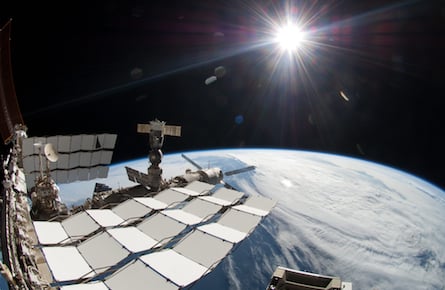Boeing and SpaceX to ferry astronauts to space station
The two winners have won contracts to deliver U.S. astronauts to the International Space Station starting in 2017
(NASA/European Space Agency/AP)
Share

Aviation giant Boeing and billionaire Elon Musk’s SpaceX have won contracts to deliver U.S. astronauts to the International Space Station (ISS) beginning in 2017.
NASA revealed the two winners during a press conference on Tuesday at the Kennedy Space Center in Florida, marking America’s return to manned space flight. It said Boeing’s contract would be worth $4.2 billion, while SpaceX’s would be $2.6 billion. Both companies have proposed capsule-type vehicles that are launched into orbit on rockets and later fall back to Earth. Boeing’s is the CST-100 and SpaceX’s is called the Dragon V2. A third company, Sierra Nevada, was unsuccessful with its small, shuttle-like design.
Over the next few years, both Boeing and SpaceX will have to complete a certification program, including a crewed test flight to the ISS, to ensure the vehicles are safe and meet the space agency’s standards for human space flight. The dual contracts each include between two and six missions carrying four crew members each time. Both companies have already received hundreds of millions of dollars from NASA to help speed development of their vehicles, which the space agency said can also be used “to sell human space transportation services to other customers.”
When asked about the decision to award its crew-carrying contract to more than one firm, NASA administrator Charles Bolden said a “robust low Earth orbit infrastructure” was necessary to realize NASA’s larger goal of eventually sending astronauts to Mars, and to expect more manned vehicles orbiting the Earth—operated by both the public and private sector—over the coming years. “We need [to serve] more destinations than the International Space Station, to be quite honest.”
Some reports in advance of the announcement predicted Boeing would emerge the big winner, because NASA felt more comfortable going with a known quantity. But it’s also possible NASA wanted to work with two companies for the same reason restaurants like having multiple foodstuffs suppliers: It keeps everyone’s pencils sharp. Besides, Musk’s SpaceX is hardly a stranger to NASA. In 2012, it made its first trip to the ISS to deliver cargo using the first version of its Dragon carrier and its own Falcon 9 rocket (which will be used again to carry the Dragon V2, while Boeing’s CST-100 would be carried aboard an Atlas V). Musk, best known for his Tesla electric car company, has not only expressed an interest in going to Mars, but colonizing it.
Amazon.com founder Jeff Bezos is also working on a rocket project called Blue Origin, which wasn’t officially part of the NASA competition. However, the Wall Street Journal reported on Tuesday that Blue Origin had quietly joined forces with Boeing.
NASA retired its space shuttle fleet in 2011, and has since been forced to send four American astronauts to the ISS every year aboard a Russian Soyuz rocket at a cost of US$71 million a seat.